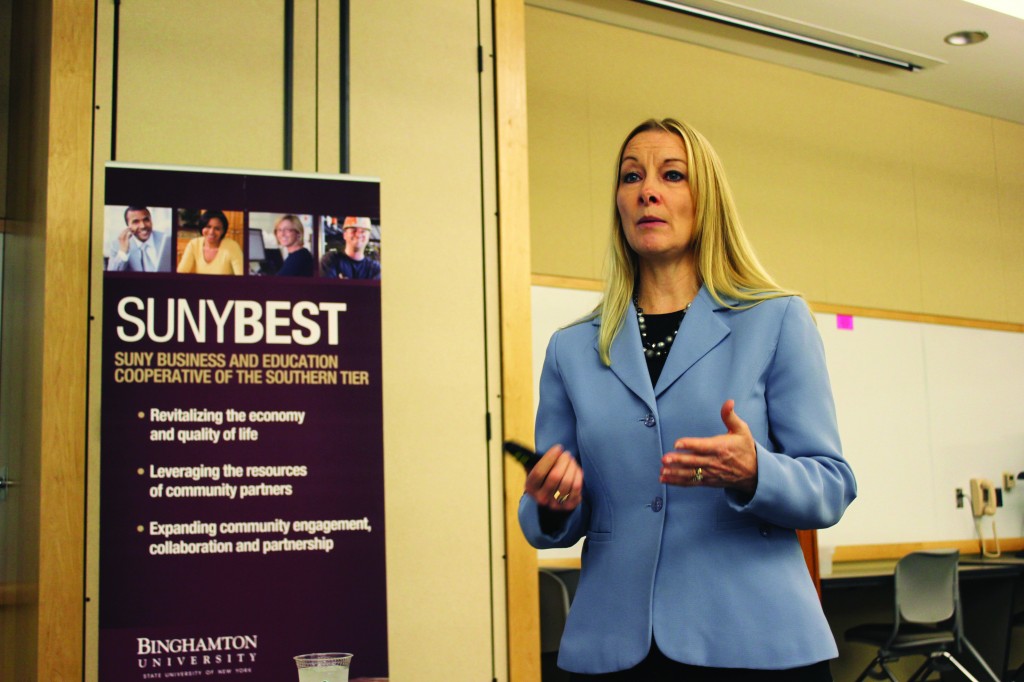
SUNY Business and Education Cooperative of the Southern Tier (SUNY BEST) turned its attention to the controversial Affordable Care Act (ACA) and its implications for small businesses, those they employ and the individual.
The presentation Thursday morning in the Binghamton University Downtown Center, given by NYS Small Business Development Center business adviser Michelle Catan, outlined how the health care revamp offered by the ACA affects small businesses and their employees.
SUNY BEST describes itself as a community-based group that promotes business alliances, information and outreach to existing businesses. In vein with its efforts to educate its partners, it hosted this event to describe how the changes implemented will affect the way small businesses and individuals deal with the health care policy.
The ACA, informally known as Obamacare, is a complete overhaul of the federal health care system, requiring every citizen to attain insurance either through his or her employer or through a virtual “exchange” or “marketplace”: HealthCare.gov, a website offering varying degrees of coverage.
Businesses with less than 50 full-time employees or 100 part-time employees are excluded from the employer mandate that requires that they provide health care. Businesses that fit this description qualify for tax credits. Currently, when they provide health care, employers can receive 35 percent of the cost of the premium insurance cost written off their taxes. The credit increases to 50 percent in 2014 through 2015 if the employer buys through the exchange.
However, these same businesses aren’t required to provide insurance, and in these situations it becomes the responsibility of the individual. According to the individual mandate, beginning 2014, all individuals must be covered by insurance or face a yearly penalty of up to $695 per adult or $2,085 for a family by 2016.
The website is set up by county. Depending on where the individual lives or where his or her employer’s company is registered, different health plans are available. For example, Tioga County offers Fidelis Care while Broome County does not.
The ACA was created to combat the issue of rising health care costs and lack of insurance that left the country with about a 15 percent uninsured rate in 2011, which fell to 14.8 percent in 2012, according to the U.S. Census. Broome County had an 8.2 percent uninsured rate in 2012.
Another issue ACA addressed was that children stopped receiving their parents’ benefits. With the ACA, kids can stay on their parents’ plan until age 26, or 29 with an additional fee. This raised questions as to whether employers should offer individual or family health insurance plans. The premium on some might be abnormally high because it would be simpler for children as old as 29, with a variety of controversial factors, to stay on their parents’ plan.
“The kids don’t have to be in college, or can be married, or can be making more money than the parent,” Catan said.
This loophole might prevent employers from offering family coverage. However, even with this in place, 6.6 million young adults gained coverage since ACA’s passing in late 2009. 150,000 of those have been in New York state.
Some of the required services in every policy are emergency services, prescription drugs, maternity and newborn care and rehabilitative services. Pediatric vision and dental are also required.
There are four “tiers” of coverage: Bronze, which covers, on average, 60 percent of expenses; Silver, covering 70 percent; Gold, covering 80 percent; and Platinum, covering 90 percent. The higher the plan, the higher the premium, but the less out-of-pocket payment.
Catan listed organizations, including ones in Broome County like the Greater Binghamton Chamber of Commerce and the Small Business Development Center, that offer trained “navigators” of the system, including herself, to help both individuals and small business owners figure out which plan is best for them.
SUNY BEST’s presentation on the Affordable Care Act’s new policies and mandates on both small businesses and individuals was not only an outline of changes but also offered Southern Tier residents and businesses information and guidance through the process.


